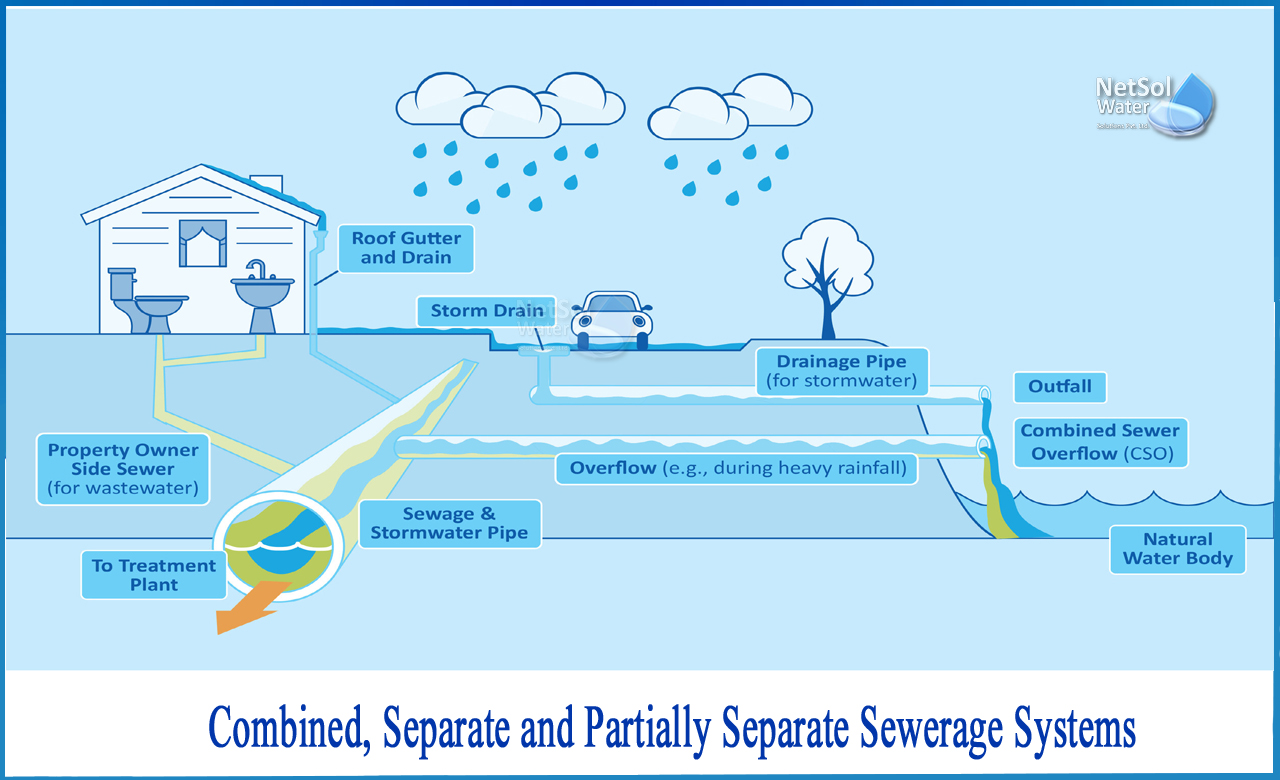What are the Pros and Cons of all sewerage systems?
A. Separate Sewerage System
Sanitary sewage and storm water are carried separately in two sets of sewers in this system. The sewage is transported to a waste water treatment plant (WWTP), and storm water is discharged into rivers untreated. The separated system is appropriate when there is a separate outlet for storm water and the topography allows storm water to be disposed of in natural drains.
Pros of a Separate System
1: Because only sewage is transported to the plant, the load on the treatment plant is reduced.
2: The sewer's size is malleable, making it cost-effective.
3: When pumping is required, the system is cost effective.
4: Sewage does not needlessly pollute natural/storm water.
Cons of a Separate System
1: Because of their small size, sewers are difficult to clean.
2: The self-cleansing velocity is difficult to achieve.
3: Storm sewers are only operational during the rainy season. During the dry season, they may become clogged by garbage.
4: The cost of maintenance is high.
Sewage sewers are installed beneath storm sewers, resulting in greater depth and pumping at the waste water treatment plant (WWTP).
B. Sewerage system that is partially separate
This system is a hybrid of the separate and combined systems, combining the best features of both. In this system, sewage and storm water from buildings are carried by one set of sewers, while storm water from roads, streets, and pavements is carried by another system of sewers, typically open drains.
Cons of a Partially Separated Sewerage System
1: It combines the best aspects of both systems.
2: The entry of storm water prevents silting.
3: Storm water from houses can be easily disposed of.
4: The sewers are of adequate size.
Cons of a Partially Separate Sewerage System
In a partially separated systems, only a small percentage of the bad features of a combined system are present.
C. Combined Sewerage System
In this system, sewage and storm water are carried together in a single set of sewers to the waste water treatment facility or wastewater treatment plant (WWTP) before disposal. Only one set of sewer is laid in this system, and it transports both sewage and stormwater. Sewage and stormwater are transported to a sewage treatment plant before being disposed of.
Pros of a Combined Sewerage System
1: Because of the larger diameter, cleaning is a breeze.
2: Maintenance costs are reasonable.
3: The strength of sewage is reduced as a result of dilution by storm water.
4: This system only requires one set of sewer, making it cost effective.
Cons of a Combined Sewerage System
1: During a storm, the sewer may overflow and cause serious health risks.
2: On dry days, the combine sewer becomes silted and foul.
3: Because storm water is also carried there, the load on the treatment plant is greater.
4: Storm water is unnecessarily polluted.
5: When pumping is required, the system becomes uneconomical.
6: When pumping is required for sewage lifting, this system proves uneconomical.
Conclusion
If you need any information about types of wastewater treatment plants best suited for you, get in touch with Netsol water. An expert from our technical sales team can provide any additional information you require.
Netsol water is one of the leading water and wastewater treatment company in India with services in the field of WTP plant manufacturing, WWTP plant manufacturing and much more. The company designs and manufactures all in one systems that are ideal for treating wastewater and the sludge generated at a sewage treatment plant.
Netsol Water is Greater Noida-based leading water & wastewater treatment plant manufacturer. We are industry's most demanding company based on client review and work quality. We are known as best commercial RO plant manufacturers, industrial RO plant manufacturer, sewage treatment plant manufacturer, Water Softener Plant Manufacturers and effluent treatment plant manufacturers. Apart from this 24x7 customer support is our USP. Call on +91-9650608473, or write us at enquiry@netsolwater.com for any support, inquiry or product-purchase related query.



